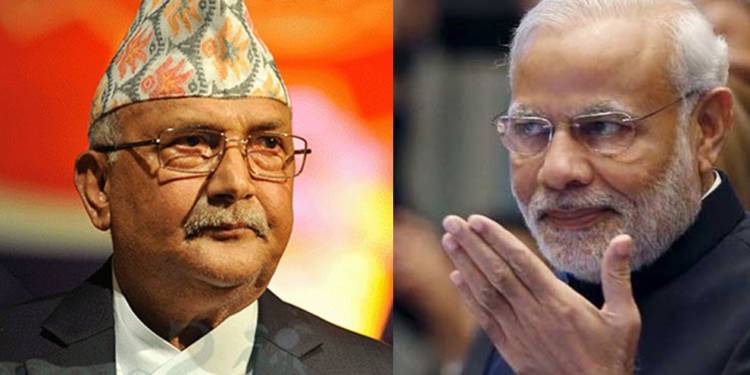Nepal seems to be coming back to a cultural neighbour after realising the perils of landing in the paper Dragon’s lap. Months after raking an imaginary territorial dispute, Kathmandu has given first signals of seeking conciliation with India by withdrawing the release of an inflammatory school book that carried revised Nepalese map showing some Indian areas in Nepal.
As per Asia Nikkei, Kathmandu’s move is being presented as an official restraint to avoid angering India further to ensure that relations with New Delhi can be normalised. The Oli government is thus seeking rapprochement with India at a time when proximity with Beijing has proved costly. Even though the Nepalese government doesn’t admit it, China has been chipping away with a lot of Nepalese territories which has, in turn, provoked protests against Chinese expansionism.
Kathmandu, of course, continues to claim that its olive branch to India is an attempt to mend ties with Nepal’s oldest ally- New Delhi. According to Asia Nikkei, Rajan Bhattarai, the Nepalese Prime Minister’s Foreign Affairs Advisor said, “We want to maintain good relations with India on the basis of mutual respect and equality.” Bhattarai added, “India and Nepal have divergent views on some issues including the territory of Kalapani along Nepal’s North-western frontier, which has remained a matter of dispute.”
Notwithstanding what Nepalese officials say, it can be understood that the Oli government is feeling compelled to swing back towards India and shun China. Otherwise, there was no reason to withdraw the inflammatory book which seemed to have the blessings of Nepal’s Prime Minister K.P. Sharma Oli himself.
In fact, the book was high on Oli administration’s agenda. It aimed at “teaching students” Nepal’s territory and border disputes, primarily with India and also carried a six-page preface written by the Himalayan country’s Education Minister Giriraj Mani Pokharel. The Oli-led Nepal Communist Party government in Kathmandu was thus hell-bent on indoctrinating Nepalese youngsters against India.
And in fact, from the very beginning, the poorly-drafted book was facing blistering criticism for the incendiary and inaccurate material that it carried. Nepalese academicians had also condemned the release of the book which threatened to put Indo-Nepal diplomatic relations in a deep freeze. Nevertheless, Oli government was unmoved despite overwhelming criticism. Kathmandu did halt the distribution of the controversial book, but, it did not withdraw it immediately at that time.
However, changing geo-political circumstances seem to have played heavily on Kathmandu, compelling Oli to give up his irredentism against India. Kathmandu’s latest rapprochement ought to be seen as a reaction to Chinese encroachment in Northern Nepal’s Humla district.
Both Nepalese diplomats and Chinese wolf-warriors denied that the paper Dragon every intruded into Nepal. However, such encroachments have given rise to anti-China public sentiment in Nepal, leading to demonstrations outside China’s Embassy in Kathmandu. Therefore, the people of Nepal do understand how Chinese expansionism works. They also know how their neighbouring country; Tibet had got occupied by China seven decades ago. Within Nepal, fears of Beijing overrunning Nepalese sovereignty are therefore very natural.
Oli government might be ideologically indoctrinated, but it cannot risk facing the ire of adverse public sentiment only to pursue Communist links with Beijing. Oli simply doesn’t have the stomach to lose popularity within his own country and pursue an illegitimate relationship with Beijing. And therefore, Kathmandu is turning back towards the other Asian giant, India.
Also, there is no real benefit in warming up to China today when the paper Dragon is facing hostility across the world. China is easily amongst the most hated countries today, and if Nepal tries to get too close to Beijing, then it would face the ire of not only New Delhi but even the West including the United States.
Even apart from Chinese incursions, it is not going to prudent for Kathmandu to befriend China and get caught up in the ongoing US-China rivalry. Nepal has already experienced how warming up to China puts its US relations in a fix. Therefore, Nepal is ready to distance itself from China and embrace India all over again in a bid to warm up to the US and the rest of the democratic world.
By rolling back school book propaganda against India, Kathmandu has thus embarked on course-correction to repair Indo-Nepal diplomatic ties.


























